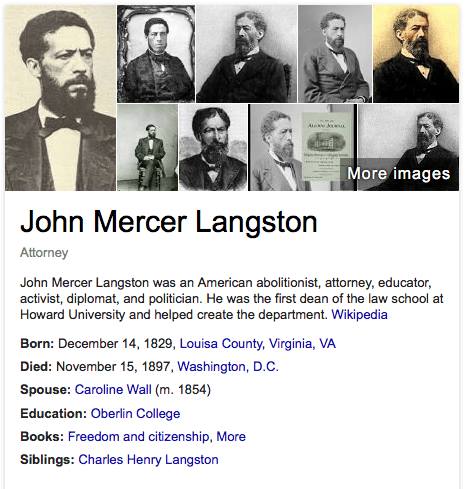GM – FBF – “The black people of America, will rise up through proper education.” – John Mercer Langston
Remember – “A nation may lose its liberties and be a century in finding it out. Where is the American liberty? … In its far-reaching and broad sweep, slavery has stricken down the freedom of us all.” – John Mercer Langston
Today in our History – April 2, 1872. John Mercer Langston, serve as dean of Howard University’s law school; it was the first black law school in the country. Appointed acting president of the school in 1872.
Together with his older brothers Gideon and Charles, John Langston became active in the abolitionist movement. He helped runaway slaves to escape to the North along the Ohio part of the Underground Railroad. In 1858 he and Charles partnered in leading the Ohio Anti-Slavery Society, with John acting as president and traveling to organize local units, and Charles managing as executive secretary in Cleveland.
In 1863 when the government approved founding of the United States Colored Troops, John Langston was appointed to recruit African Americans to fight for the Union Army. He enlisted hundreds of men for duty in the Massachusetts Fifty-fourth and Fifty-fifth regiments, in addition to 800 for Ohio’s first black regiment. Even before the end of the war, Langston worked for issues of black suffrage and opportunity. He believed that black men’s service in the war had earned their right to vote, and that it was fundamental to their creating an equal place in society.
After the war, Langston was appointed inspector general for the Freedmen’s Bureau, a Federal organization that assisted freed slaves and tried to oversee labor contracts. The Bureau also ran a bank and helped establish schools for freedmen and their children.
In 1864 Langston chaired the committee whose agenda was ratified by the black National Convention: they called for abolition of slavery, support of racial unity and self-help, and equality before the law. To accomplish this program, the convention founded the National Equal Rights League and elected Langston president. He served until 1868. Like the later National Association for the Advancement of Colored People (NAACP), the League was based in state and local organizations. Langston traveled widely to build support. “By war’s end, nine state auxiliaries had been established; some twenty months later, Langston could boast of state leagues nearly everywhere.”
In 1868 Langston moved to Washington, D.C. to establish and serve as dean of Howard University’s law school; it was the first black law school in the country. Appointed acting president of the school in 1872, and vice president of the school, Langston worked to establish strong academic standards. He also engendered the kind of open environment he had known at Oberlin College. Langston was passed over for the permanent position of president of Howard University School of Law by a committee that refused to disclose the reason.
During 1870, Langston assisted Republican Senator Charles Sumner from Massachusetts with drafting the civil rights bill that was enacted as the Civil Rights Act of 1875. The 43rd Congress of the United States passed the bill in February 1875 and it was signed into law by President Ulysses S. Grant on March 1, 1875.
President Ulysses S. Grant appointed Langston a member of the Board of Health of the District of Columbia.
In 1877 President Rutherford Hayes appointed Langston as U.S. Minister to Haiti; he also served as chargé d’affaires to the Dominican Republic.
After his diplomatic service, in 1885 Langston returned to the US and Virginia. He was appointed by the state legislature as the first president of Virginia Normal and Collegiate Institute, a historically black college (HBCU) at Petersburg. There he also began to build a political base.
In 1888, Langston was urged to run for a seat in the U.S. House of Representatives by fellow Republicans, both black and white. Leaders of the biracial Readjuster Party, which had held political power in Virginia from 1879 to 1883, did not support his candidacy. Langston ran as a Republican and lost to his Democratic opponent. He contested the results of the election because of voter intimidation and fraud.
After 18 months, the Congressional elections committee declared Langston the winner, and he took his seat in the U.S. Congress. He served for the remaining six months of the term, but lost his bid for reelection as Democrats regained control of Virginia. Langston was the first black person elected to Congress from Virginia, and he was the last for another century. In a period of increasing disenfranchisement of blacks in the South, he was one of five African Americans elected to Congress during the Jim Crow era of the last decade of the nineteenth century. Two were elected from South Carolina and two from North Carolina. After them, no African Americans would be elected to Congress from the South until 1972, after passage of federal civil rights legislation enforcing constitutional rights for all citizens.
In 1890 Langston was named as a member of the board of trustees of St. Paul Normal and Industrial School, a historically black college, when it was incorporated by the Virginia General Assembly. In this period, he also wrote his autobiography, which he published in 1894.
From 1891 until his death in 1897, he practiced law in Washington, D.C. He died at his home, Hillside Cottage at 2225 Fourth Street NW in Washington, DC, on the morning of November 15 from malaria induced acute indigestion. After spending time at Harmony Cemetery in Maryland, and despite talk of sending him to Nashville for burial, he was buried at Woodlawn Cemetery in Washington, DC.
Langston’s house in Oberlin has been designated as a National Historic Landmark, Langston was the great-uncle of the poet James Mercer Langston Hughes (called Langston Hughes). Research more about this great American and share with your babies and make it a champion day!

